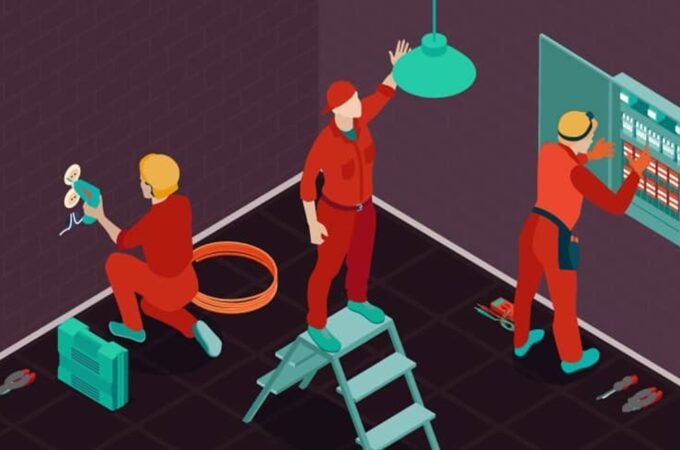
Boost Your Business with Professional Commercial HVAC Installation Services
When it comes to running a successful commercial establishment, one often overlooked but critical aspect is the HVAC (heating, ventilation, and air conditioning) system. This unassuming network of equipment is the unsung hero behind maintaining comfortable indoor conditions.
HVAC systems in commercial buildings account for approximately 39% of total energy consumption, as reported by the U.S. Department of Energy in their 2018 Commercial Building Energy Consumption Survey (CBECS). This statistic highlights the significant impact of HVAC systems on energy efficiency and operational costs.
In this comprehensive guide, we’ll explore how professional commercial HVAC installation services can elevate your business operations, enhance energy efficiency, and ensure the longevity of your HVAC system.
Table of Contents
ToggleThe Importance of HVAC Systems in Commercial Spaces
Professional commercial HVAC installation services don’t just install efficient HVAC systems; they are vital for businesses of all sizes and industries. To truly appreciate the importance of an efficient HVAC system, let’s explore why its performance is paramount in commercial spaces.
1. Employee Productivity
Numerous studies have shown that indoor air quality affects employee performance and well-being. Offices plagued by poor ventilation, erratic temperatures, and elevated CO2 levels experience heightened fatigue and decreased motivation among workers.
A properly optimized HVAC system ensures cleaner air circulation and maintains consistent heating and cooling, creating an environment where employees can thrive.
2. Customer Experience
For businesses in the retail, restaurant, and hospitality sectors, customer comfort is a paramount factor in ensuring satisfaction. Unpleasantly warm, stuffy air or the intrusive hum of malfunctioning AC units can significantly detract from the overall customer experience.
Professional commercial HVAC installation services guarantee the creation of an optimal ambient atmosphere that keeps customers content and returning.
3. Equipment Lifespan
Inadequately sized or poorly installed HVAC systems can place undue strain on the equipment, potentially shortening its operational life by several years. Professional installation ensures the system operates optimally, maximizing its longevity and protecting your investment.
4. Energy Efficiency
HVAC systems account for approximately 40% of energy consumption in commercial buildings. Even minor enhancements in system efficiency can translate into substantial savings over time. Professional installers possess the expertise to fine-tune system components for seamless integration, achieving peak efficiency.
5. Operational Costs
Beyond affecting energy bills, subpar HVAC performance leads to additional expenses, such as increased employee absenteeism and heightened maintenance requirements. Professional installation reduces these costs over the long term, making it a prudent investment.
6. Rebates & Incentives
Numerous utility companies and state or local programs offer generous rebates and tax credits for the installation of energy-efficient HVAC systems. However, the incentives are contingent upon professional installation, ensuring the businesses reap the financial benefits of energy efficiency.
Why Professional Installation Matters
While procuring high-quality HVAC equipment is a substantial investment, the installation process is equally pivotal in determining system performance and longevity. Consider the consequences of unprofessional installation:
1. Energy Waste
Errors such as incorrect refrigerant charging, duct leakage, and other installation-related mistakes can significantly reduce system efficiency, leading to a wasteful consumption of energy. This can result in soaring operating costs.
2. Frequent Repairs
Subpar installation can accelerate the wear and tear of components, causing them to fail prematurely. This necessitates costly and frequent repairs and replacements.
3. Lost Productivity
Poor air circulation and discomforting temperatures create an environment where employees find it challenging to remain focused and motivated. This adversely affects business productivity and profitability.
4. Voided Warranties
Manufacturers may refuse to honor equipment warranties if they determine that the HVAC system was improperly installed, leaving businesses to bear the full brunt of repair or replacement costs.
5. Reputation Damage
Word travels swiftly about businesses with uncomfortable facilities. Negative reviews and unfavorable word-of-mouth publicity can deter customers from returning, resulting in lost revenue.
6. Safety Concerns
Improper refrigerant usage and lack of carbon monoxide detectors will result in significant safety risks. All these are possible when a non-professional works on the installation process.
Although cutting corners to save costs by hiring amateur installers or attempting DIY installation may seem like a prudent financial decision initially, it can ultimately prove to be a costly mistake over the lifespan of your HVAC system. Opting for professional commercial HVAC installation services is a strategic investment that consistently delivers substantial returns.
Key Features of Professional Commercial HVAC Installation Services
Professional commercial HVAC installation services extend beyond the mere setup of equipment. They encompass a suite of critical features designed to optimize system performance, energy efficiency, and indoor air quality. Let’s delve deeper into these key elements:
1. Equipment Selection
Professional HVAC experts carefully evaluate your commercial space’s unique requirements, including square footage, layout, occupancy, and usage patterns. This comprehensive assessment ensures the selection of an HVAC system tailored precisely to your business needs.
2. Load Calculations
Accurate calculations are conducted to determine the heating and cooling capacity necessary for your space. Oversized or undersized systems can result in energy inefficiencies, but professional installers ensure the right fit.
3. Ductwork Design
Custom ductwork is essential for ensuring efficient air circulation throughout your establishment. Professionals design duct systems that minimize leaks, and pressure drops, and ensure balanced air distribution.
4. Advanced Installation Tools
Professional installers employ cutting-edge tools such as laser alignment, reducing errors and facilitating seamless component integration.
5. Zoning
In larger commercial spaces, zoning involves dividing the HVAC system into distinct, controllable sections. This approach enhances both comfort and energy efficiency by allowing customized temperature control in specific areas.”
6. System Commissioning
After installation, thorough testing and adjustments are carried out to ensure optimal performance. Fine-tuning airflows, verifying temperature control, and inspecting for leaks are all integral parts of the commissioning process.
Cost Implications and Long-Term Benefits
Every astute business owner recognizes the importance of making sound investments that yield long-term benefits. Professional HVAC installation not only safeguards your investment but also offers a multitude of financial advantages:
1. Energy Efficiency
A correctly sized and optimized HVAC system consumes significantly less energy, resulting in substantial cost savings year after year.
2. Enhanced Equipment Lifespan
Proper installation minimizes wear and tear, allowing your HVAC equipment to operate at peak performance and extending its usable lifespan. This maximizes your return on investment.
3. Improved Air Quality
Efficient air circulation and filtration lead to healthier indoor air quality. This can reduce employee absenteeism, enhance overall comfort, and boost productivity.
4. Optimized Temperature Control
Consistent heating and cooling eliminate uncomfortable hot or cold spots, ensuring that both customers and staff enjoy an ideal working environment.
5. Peace of Mind
Professional installation instills confidence that your HVAC system will perform reliably for years to come, minimizing unexpected breakdowns and maintenance hassles.
6. Potential Tax Credits and Rebates
Many utility companies and municipalities offer incentives for installing energy-efficient HVAC systems. These financial perks further enhance the cost-effectiveness of professional installation.
While the upfront cost of professional installation may appear substantial, it is essential to consider the substantial long-term savings and benefits. It is an investment that pays for itself and contributes to the sustainable growth and success of the business.
Selecting an HVAC Installation Service Provider
Once you have decided to invest in professional commercial HVAC installation services, the next crucial step is selecting the right service provider. Here are the key factors to consider when making this pivotal choice:
1. Relevant Experience
Look for a service provider with extensive experience in installing HVAC systems. Because the practical knowledge and experience of the professionals will have a positive impact.
2. Industry Certifications
Contractors holding certifications from organizations like NATE (North American Technician Excellence) have undergone rigorous training and testing, validating their expertise in HVAC installation.
3. Customized Quotes
Avoid generic “one-size-fits-all” bids. Instead, choose a contractor who provides quotes tailored to the unique requirements of your commercial space, ensuring accuracy and transparency in cost estimation.
4. Strong References
Reputable HVAC companies should readily provide you with impressive client references that vouch for the quality of their work and their commitment to customer satisfaction.
5. Ongoing Maintenance Plans
Many professional HVAC service providers offer maintenance contracts for regular system servicing after installation. This ensures that your HVAC system continues to operate optimally over time.
6. Manufacturers Endorsement
Contractors endorsed by renowned HVAC manufacturers are held to high standards and have received specialized training on those specific products. This expertise translates into superior installation quality.
Investing the time and effort to carefully select an experienced HVAC installation company will yield dividends through years of HVAC system efficiency and performance. Your choice of installation provider is integral to ensuring that your HVAC system not only meets but exceeds your expectations.
FAQs
1. How often should a commercial HVAC system be replaced or upgraded?
On average, commercial HVAC systems should be replaced after 15-20 years. Upgrades may be warranted earlier if technology advancements significantly improve system efficiency. Regular maintenance plays a pivotal role in maximizing system lifespan.
2. What are the signs that indicate poor HVAC installation?
Frequent occurrences of hot or cold spots, excessive humidity or stuffiness, significantly higher energy bills than expected, and unusual noises emanating from vents all point to subpar HVAC installation.
3. How can businesses ensure they’re getting a fair quote for HVAC installation services?
To secure a fair quote, it is advisable to obtain multiple bids from reputable contractors. Compare not only the costs of equipment but also labor charges. Additionally, inquire about potential rebates and incentives offered by utility companies, as these can further offset installation expenses.
Remember that a higher quote does not always equate to better service; assess the value offered by each contractor carefully.
Final Take-Aways
Efficiency and properly installed HVAC systems are the lifeblood of commercial spaces. The long-term benefits of reduced energy consumption, financial savings, tax incentives, improved air quality, and enhanced comfort make professional installation services a judicious and strategic business move.
Partnering with a reputable and certified HVAC contractor is more than just a choice; it is an investment in the success of your business. Don’t leave something as crucial as your HVAC system to chance. Prioritize professional installation for a commercial space that allows your business to thrive.





